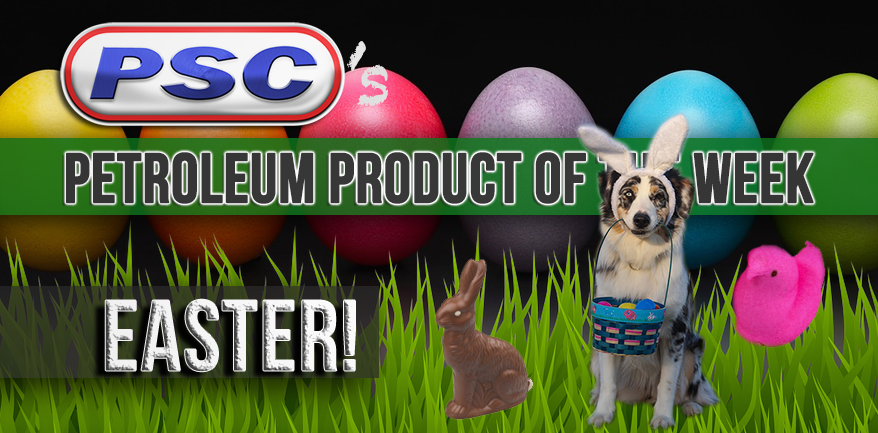Petroleum Product of the Week: Easter
By on Apr 14 2017

When it comes to traditions, there is no holiday more colorful than Easter.
Between the brightly dyed eggs, baskets full of multicolored grass, special flowers, and all kinds of yummy goodies, rebirth has never looked or tasted so good.
The way we celebrate Easter today is the result of many, many, many, many, many years' worth of traditions from various cultures across the globe. And through these traditions, Easter has become one of the most widely celebrated holidays both religiously and secularly.
When you consider some of the biggest components of modern Easter celebrations, these include the Easter Bunny, egg decorating, and baskets full of candy. But what helps make Eastertide so sweet? You may have guessed it: petroleum.

You could say that modern Eastern traditions run on petroleum.
It was in the 2nd century when the first European celebration of Easter was recorded (though realistically, there's a good chance it was celebrated even earlier than that). Suffice it to say, I wasn't kidding when I said Easter traditions go back many, many, many, many, many years.
Rabbits, for instance, are ancient symbols of fertility and new life. The connection between these hippity hoppity symbols of new life and Easter arose sometime in Protestant Europe during the 17th century. The Easter rabbits then probably made their way across the pond to America a century later with the German immigrants.
Like our fertile bunnies, eggs are also symbols of fertility and renewal. Their importance to Easter traditions, however, might have been a little bit more practical. At one point, eggs were among a list of foods that were banned during the entirety of lent. And since Easter marks the end of lent and fasting, eating them was a special treat! Decorating eggs is also one of the oldest Easter customs (because what better way to celebrate the special egg treats than by making them look pretty?!)
And let's not forget about all that candy.
For Easter, candy is kind of a big deal. In fact, more candy is sold at easter than any other holiday (except Halloween, of course!). Every year, U.S. candy manufacturers produce around 90 million chocolate bunnies and 16 billion jelly beans each year. That's a lot of sugar... and cavities.
Petroleum: it just keeps going and going and going and going....

Petroleum products play a huge role in modern easter celebrations petroleum it can be found in everything from the easter grass, the dyed eggs, the candy, and even the Easter Bunny itself.
For Eastertide, both plastic eggs (filled with goodies for egg hunts) and dyed easter eggs are technically petroleum products. With the plastic type, this is a given (plastic, duh). But for the hard-boiled variety, the petroleum lies in the dyes. Whether you buy egg dying kits or make your own, most artificial food dyes are made from petroleum.
When it comes to the easter basket itself, you have a lot of opens. You can go with the traditional basket, some kind of bucket-like container, some kind of fabric tote... or anything, really. You could even use a grocery tote if you really wanted (remember: it's what's inside that counts, anyway). But say you're going with the traditional basket: you can have woven wicker, straw, bamboo, palm, metal, and even plastic. And in this day and age, plastic is easy to find in the stores (especially on the cheap baskets can get expensive).
For the basket's innards, you might want to fluff up the treats with some colorful Easter grass. Plastic grass is one of the most common types to purchase however, if you go this route, be sure to take care that you don't litter. If your Easter festivities involve the outdoors, animals might get their hands (or mouths, rather) on the grass. So can your indoor pets (or children), for that matter. And animals plus ingested plastic is not a good thing. For alternatives, you can shred colorful paper (or use real grass?).
And now on to the most important part: that sweet, sweet candy.
Jelly beans are one of Easter's favorite candies (even if you personally can't stand them). First developed in the 17th century, they became popular Easter treats in the 1930s because of their close resemblance to eggs. Among their many ingredients, jelly beans may contain a bit of paraffin wax in their food-grade glaze to prevent stickiness and add shine.

Another Easter favorite that can contain traces of petroleum-derived paraffin is chocolate. That's right your little chocolate bunny might be on that list, though it's admittedly hard to tell because it may not be listed among the other ingredients. The wax is used in chocolates (and other candies) to give it a nice, glossy finish and help keep it solid at room temperature. More expensive chocolates don't often use wax due to their longer tempering processes.
Now to those beloved chick- or bunny-shaped marshmallow treats. The sparkly neon pinks and purples are the result of artificial food coloring. Propylene glycol (the stuff found in e-juice) is also a petroleum-derived product found in more places than you might think including some packaged frostings, boxed cake mix, and food coloring.
Petroleum plays a larger role in holiday celebrations than you might expect. Any type of plastic plates, cutlery, or even food packages are made from a variety of plastics and synthetic resins.Your Easter Sunday best? Check those clothing labels and see if it's in your style this season.
Oh, and if good ole' Peter Cottontail is made from something other than cotton (say, polyester), then he, too, is a petroleum product.






